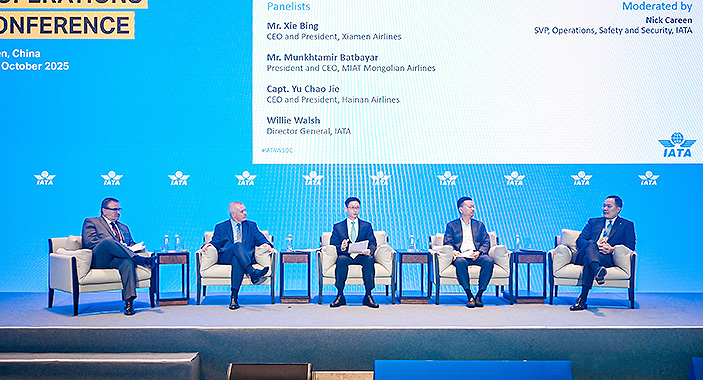
IATA WSOC Oct 14, 2025: News Coverage
Global airline association emphasizes priorities for aviation safety at industry summit
October 15th 2025
At the opening day of the International Air Transport Association (IATA) World Safety and Operations Conference (WSOC) on October 14, three critical priorities for aviation safety and operations were presented to delegates at the Xiamen summit. Read More » They are: defending and evolving global standards, fostering a strong safety culture through leadership and using data to enhance performance amid increasing operational challenges. World standards must be adhered to addressing Global Navigation Satellite Systems (GNSS) interference, protecting aviation’s radio spectrum and timely accident investigation reporting, IATA said. These priorities are becoming more relevant in the current environment of geopolitical instability, the association said.
At present, the war in Ukraine results in 2,000 flights cancelled and 1,500 rerouted daily. The India-Pakistan conflict created more than 200 daily diversions. Air traffic at some waypoints was up 70%-80%, delegates heard.
Additionally, drone incursions are putting pressure on airspace in some European countries and GNSS interference reports have increased by 200% since 2021, IATA said. “The environment in which airlines operate has grown even more complex as conflicts and regulatory fragmentation have proliferated. As a result, we have seen more airspace closures, drone incursions and rising global navigation satellite system (GNNS) interference disrupt connectivity, undermine confidence and threaten safety. Ensuring aviation remains the safest mode of transport requires strong leadership, robust adherence to global standards and smarter use of data. By focusing on these—industry and government together—we will build a safer, more resilient and increasingly efficient global aviation system that can manage today’s risks and is prepared for those of tomorrow,” IATA global director of safety, Mark Searle, said.
Airline relations with OEMs “not sustainable from financial point of view”
Discussing the current supply chain issues during the CEO panel on the first day of the WSOC, IATA director general, Willie Walsh, highlighted the disparity between the two digit profit margins of some OEMs and the airline industry’s single digit profit margin. “This is not working properly,” Walsh said.
Hainan Airlines CEO and president, Captain Yu Chao Jie, added that before the pandemic spare parts cost increases were about 3%. Now they average 12%. Another serious issue [for airlines] is the time the OEMs take to do some maintenance work, reaching up to 100 days at times, he added. “Airlines work for OEMs”, Yu concluded. “It is not sustainable from financial point of view”, Walsh said.
ICAO highlights importance of aviation safety in Asia-Pacific aviation development
Already, the Asia-Pacific is the biggest aviation market in the world, but its global market share may grow to more than 50% because of the region’s economic development, International Civil Aviation Organization’s (ICAO), Ma Tao, regional director of the association’s Asia and Pacific Office, said in his opening address at WSOC.
A recent decrease in safety performance if not addressed brings the risk that strong economic development may put pressure on safety, Ma warned. “This highlights the importance of holding events such as WSOC,” he said.